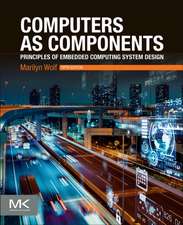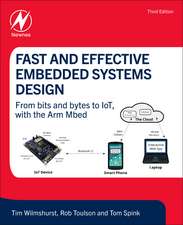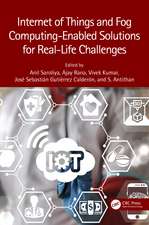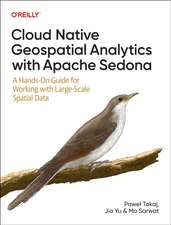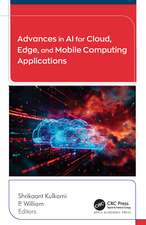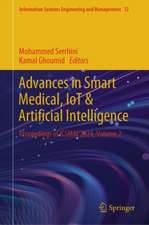Special Topics in Multimedia, IoT and Web Technologies
Editat de Valter Roesler, Eduardo Barrére, Roberto Willrichen Limba Engleză Paperback – 3 mar 2021
| Toate formatele și edițiile | Preț | Express |
|---|---|---|
| Paperback (1) | 1113.34 lei 6-8 săpt. | |
| Springer International Publishing – 3 mar 2021 | 1113.34 lei 6-8 săpt. | |
| Hardback (1) | 1119.39 lei 6-8 săpt. | |
| Springer International Publishing – 3 mar 2020 | 1119.39 lei 6-8 săpt. |
Preț: 1113.34 lei
Preț vechi: 1391.67 lei
-20%
Puncte Express: 1670
Preț estimativ în valută:
196.77€ • 231.50$ • 171.77£
196.77€ • 231.50$ • 171.77£
Carte tipărită la comandă
Livrare economică 06-20 aprilie
Specificații
ISBN-13: 9783030351045
ISBN-10: 3030351041
Pagini: 274
Ilustrații: XXXII, 274 p. 141 illus., 131 illus. in color.
Dimensiuni: 155 x 235 mm
Greutate: 0.44 kg
Ediția:1st ed. 2020
Editura: Springer International Publishing
Colecția Springer
Locul publicării:Cham, Switzerland
ISBN-10: 3030351041
Pagini: 274
Ilustrații: XXXII, 274 p. 141 illus., 131 illus. in color.
Dimensiuni: 155 x 235 mm
Greutate: 0.44 kg
Ediția:1st ed. 2020
Editura: Springer International Publishing
Colecția Springer
Locul publicării:Cham, Switzerland
Cuprins
Foreword (by Maria da Graça Pimentel)
Preface (by the editors).
Chapter 1: SOFT-IoT platform: deploying Fog Computing in Internet of Things environments. Leandro Andrade (UFBA – Federal University of Bahia), Cleber Lira (IFBA – Federal Institute of Bahia), Brenno Mello (UFBA), Andressa Andrade (UFBA), Antonio Augusto Teixeira Ribeiro Coutinho (UEFS – State University of Feira de Santana), Fabíola Greve (UFBA), Cássio Prazeres (UFBA).
Chapter 2: Developing visual sensors for IoT applications with Raspberry Pi. Daniel G. Costa (UEFS), João Paulo Just Peixoto (IFBA), Antônio Augusto Teixeira Ribeiro Coutinho (UEFS), Elisangela Oliveira Carneiro (UEFS).
Chapter 3: Evolution of Web Systems Architectures: a roadmap. Raoni Kulesza (UFPB – Federal University of Paraiba), Matheus Lima Moura de Araujo (UFPB), Claudiomar Pereira de Araujo (UFPB), Marcelo Fernandes de Sousa (IESP - Institute of Higher Education of Paraíba), Aguinaldo Macedo Filho (TCE-PB – Audit Office of Paraiba).
Chapter 4: Multimedia Game Development to User Experience Data Collection. Marcio Maestrelo Funes (USP ICMC – Institute of Mathematic and Computer Science, Sao Paulo University), Leandro Agostini do Amaral (USP ICMC), Renata Pontin Mattos Fortes (USP ICMC), Rudinei Goularte (USP ICMC).
Chapter 5: A basic approach for extracting and analyzing data from Twitter. Clarissa Castellã Xavier (UFRGS – Federal University of Rio Grande do Sul), Marlo Souza (UFBA).
Chapter 6: Data from Multiple Web Sources: Crawling, Integrating, Preprocessing and Designing Applications. Natércia A. Batista (UFMG – Federal University of Minas Gerais), Michele A. Brandão (IFMG - Federal Institute of Minas Gerais), Michele B. Pinheiro (UFMG), Daniel H. Dalip (CEFET-MG – Federal Center of Technological Education of Minas Gerais) and Mirella M. Moro (UFMG).
Chapter 7: A model-driven engineering approach for ubiquitous applications development. Marcos Alves Vieira (IF Goiano – Federal Institute Goiano), Sergio T. Carvalho (UFG – Federal University of Goiás).
Chapter 8: Authoring Multimedia Learning Objects with Cacuriá Tool. André Luiz de Brandão Damasceno (PUC-Rio), Antonio José Grandson Busson (PUC-Rio), Thacyla de Sousa Lima (UFMA) and Carlos de Salles Soares Neto (UFMA).
Chapter 9: Embedding Deep Learning Features into Hypermedia Applications. Antonio José Grandson Busson (PUC-Rio – Pontifical Catholic University of Rio de Janeiro), Álan Livio V. Guedes (PUC-Rio), Sérgio Colcher (PUC-Rio), Ruy Luiz Milidiú (PUC-Rio) e Edward Hermann Haeusler (PUC-Rio).
Index
Preface (by the editors).
Chapter 1: SOFT-IoT platform: deploying Fog Computing in Internet of Things environments. Leandro Andrade (UFBA – Federal University of Bahia), Cleber Lira (IFBA – Federal Institute of Bahia), Brenno Mello (UFBA), Andressa Andrade (UFBA), Antonio Augusto Teixeira Ribeiro Coutinho (UEFS – State University of Feira de Santana), Fabíola Greve (UFBA), Cássio Prazeres (UFBA).
Chapter 2: Developing visual sensors for IoT applications with Raspberry Pi. Daniel G. Costa (UEFS), João Paulo Just Peixoto (IFBA), Antônio Augusto Teixeira Ribeiro Coutinho (UEFS), Elisangela Oliveira Carneiro (UEFS).
Chapter 3: Evolution of Web Systems Architectures: a roadmap. Raoni Kulesza (UFPB – Federal University of Paraiba), Matheus Lima Moura de Araujo (UFPB), Claudiomar Pereira de Araujo (UFPB), Marcelo Fernandes de Sousa (IESP - Institute of Higher Education of Paraíba), Aguinaldo Macedo Filho (TCE-PB – Audit Office of Paraiba).
Chapter 4: Multimedia Game Development to User Experience Data Collection. Marcio Maestrelo Funes (USP ICMC – Institute of Mathematic and Computer Science, Sao Paulo University), Leandro Agostini do Amaral (USP ICMC), Renata Pontin Mattos Fortes (USP ICMC), Rudinei Goularte (USP ICMC).
Chapter 5: A basic approach for extracting and analyzing data from Twitter. Clarissa Castellã Xavier (UFRGS – Federal University of Rio Grande do Sul), Marlo Souza (UFBA).
Chapter 6: Data from Multiple Web Sources: Crawling, Integrating, Preprocessing and Designing Applications. Natércia A. Batista (UFMG – Federal University of Minas Gerais), Michele A. Brandão (IFMG - Federal Institute of Minas Gerais), Michele B. Pinheiro (UFMG), Daniel H. Dalip (CEFET-MG – Federal Center of Technological Education of Minas Gerais) and Mirella M. Moro (UFMG).
Chapter 7: A model-driven engineering approach for ubiquitous applications development. Marcos Alves Vieira (IF Goiano – Federal Institute Goiano), Sergio T. Carvalho (UFG – Federal University of Goiás).
Chapter 8: Authoring Multimedia Learning Objects with Cacuriá Tool. André Luiz de Brandão Damasceno (PUC-Rio), Antonio José Grandson Busson (PUC-Rio), Thacyla de Sousa Lima (UFMA) and Carlos de Salles Soares Neto (UFMA).
Chapter 9: Embedding Deep Learning Features into Hypermedia Applications. Antonio José Grandson Busson (PUC-Rio – Pontifical Catholic University of Rio de Janeiro), Álan Livio V. Guedes (PUC-Rio), Sérgio Colcher (PUC-Rio), Ruy Luiz Milidiú (PUC-Rio) e Edward Hermann Haeusler (PUC-Rio).
Index
Notă biografică
Valter Roesler is an associate professor at the Federal University of Rio Grande do Sul (UFRGS), Brazil. He has a PhD degree (2003) and Master degree (1993) in Computer Science, and BSc in Electrical Engineering (1988). He coordinates the PRAV laboratory (Projects in Audio and Video) since 1998, and his interest areas are Multimedia, Computer Networks and eHealth.
Eduardo Barrere is a professor at the Federal University of Juiz de Fora (UFJF), Brazil. He has Ph.D. degree (1996) and Master degree in Systems Engineering and Computing (UFRJ). He coordinates the LapIC laboratory (Applications and Innovation in Computing), developing research in development and use multimedia applications and information retrieval in video.
Roberto Willrich received the B.S. and M.Sc. degrees in electrical engineering from the Federal University of Santa Catarina (UFSC), Florianopolis, Brazil, in 1988 and 1991, respectively, and the Ph.D. degree from Université Paul Sabatier, Toulouse, France, in 1996. Also, he was a visiting researcher at LAAS-CNRS in 2005-2006. He is currently a full professor of Computer Science with the UFSC. His research interests include recommender systems, knowledge systems, semantic Web, and annotation systems.
Textul de pe ultima copertă
This book presents a set of recent advances that involve the areas of multimedia, IoT, and web technologies. These advances incorporate aspects of clouds, artificial intelligence, data analysis, user experience, and games. In this context, the work will bring the reader the opportunity to understand new possibilities of use and research in these areas. We think that this book is suitable for students (postgraduates and undergraduates) and lecturers on these specific topics. Professionals can also benefit from the book since some chapters work with practical aspects relevant to the industry.
Caracteristici
Up-to-date information about several trendy topics in Multimedia and the Web
Practical examples teaching how to use platforms related to these topics
A didactic approach, aiming to show how these concepts relate to solving real problems in Computer Science, mainly in the area of Multimedia and the Web
Practical examples teaching how to use platforms related to these topics
A didactic approach, aiming to show how these concepts relate to solving real problems in Computer Science, mainly in the area of Multimedia and the Web



